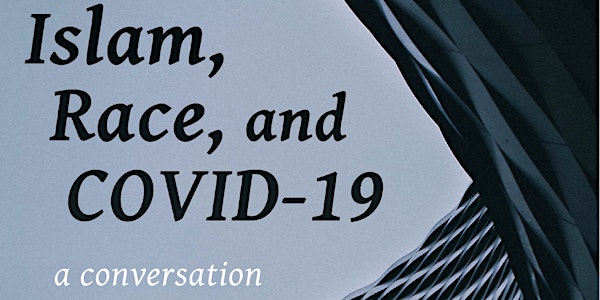
Islam, Race, and COVID-19: A Conversation
A Panel Discussion with Shabana Mir, Kameelah Rashad, and Donna Auston
Date and time
Location
About this event
Please join us for this discussion featuring the following panelists:
Shabana Mir, American Islamic College
Kameelah Rashad, Muslim Wellness Foundation
Donna Auston, Rutgers University
Moderated by Kecia Ali, Boston University
Dr. Donna Auston will discuss how Black Muslims in the US, by virtue of their multiply marginalized social location, have been significantly impacted by the COVID-19 pandemic and the “pandemic of white supremacy”—and how Black Muslim activists have organized and mobilized resources on behalf of their communities in response to both crises.
Dr. Kameelah Mu’min Rashad will use survey data to explore how Black Muslims have coped with COVID-19 and its physical and economic impacts alongside social unrest and racial violence by “holding on to the light of faith,” shifting some religious practices and drawing on spiritual and cultural resilience to resist oppression and make meaning of suffering, violence and white supremacy.
Dr. Shabana Mir will speak about “Muslim religious responses to COVID-19,” exploring how Muslims adapt and organize in response to the demands and challenges of this time as well as in sensitivity to diverse Muslim ideologies and agendas, with particular attention to women’s struggles and strategies to gain access to Muslim religious and spiritual spaces.
Speaker Bios:
Dr. Donna Auston is an anthropologist, writer, and activist whose body of work focuses primarily on race, ethnicity, gender, religion, media representation, and Islam in America. Her dissertation research explores Black Muslim activism and spiritual protest in the post-Ferguson, Black Lives Matter era. Some of her other written work includes book chapters on the historical contributions of African American Muslims in the arts, culture, and social justice movements, and the connections between Islamophobia and Black Lives Matter. She currently teaches at Rutgers University, and is a member of the recently formed Black Muslim COVID Coalition. Dr. Auston has also published works on Black Islam and U.S. Politics, as well as a number of short essays on the lived experiences of Black Muslims with anti-Black racism, state surveillance, law enforcement profiling, and Islamophobia. Her work has been covered by national news outlets, including NBC News, and The Huffington Post, and was named one of the top 100 Muslim Social Justice leaders by MPower Change in 2016.
Dr. Shabana Mir is Associate Professor of Anthropology at American Islamic College, Chicago, international public speaker on Islam, gender, and education, and author of the award-winning book Muslim American Women on Campus: Undergraduate Social Life and Identity (University of North Carolina Press, 2014). Muslim American Women on Campus won the Outstanding Book Award (National Association for Ethnic Studies) and the Critics’ Choice Award (American Educational Studies Association). Dr. Mir has lived, studied, and taught in the United States, the United Kingdom, and Pakistan. She has worked as a curriculum designer, residence hall director, retreat leader, faculty development expert, and research consultant in a variety of settings. She has written academic chapters, journal articles, children’s literature, a blog, and, of course, her book. She is an international public speaker on gender, religion, education, and politics. She speaks English, Urdu and Punjabi, and some Arabic and Farsi. She is also a long-standing blogger at http://koonjblog.wordpress.com.
Dr. Kameelah Mu’Min Rashad, PsyD, is the Founder and President of Muslim Wellness Foundation (MWF), which promotes healing and emotional well-being in the American Muslim community through dialogue, education and training; through it, she established the annual Black Muslim Psychology Conference and the Deeply Rooted Emerging Leaders Fellowship for Black Muslim young adults. She is the founding co-Director of the National Black Muslim COVID Coalition, an initiative launched in collaboration with Muslim Anti-Racism Collaborative to address need for effective planning, preparedness and organizing during the COVID-19 pandemic. Dr. Rashad, who previously served as University of Pennsylvania’s Muslim chaplain, now serves as the Fellow for Spirituality, Wellness and Social Justice and advises the Black Muslim student organization. Dr. Rashad’s clinical and research areas of interest include: spirituality in psychotherapy, mental health stigma in faith and minority communities, first generation college students and emerging adults of color; diversity, religious identity and multicultural issues in counseling, healing justice and faith based activism, racial trauma and healing, psychological impact of anti-Muslim bigotry and anti-Blackness, Black Muslim psychology and Black Muslim intersectional invisibility. Dr. Rashad has degrees from the University of Pennsylvania, the International Institute for Restorative Practices, and Chestnut Hill College.
Dr. Kecia Ali is Professor of Religion and Chair of the Department of Religion at Boston University. Her research focuses on Islamic law; women and gender; ethics; and biography. Her books include Sexual Ethics and Islam: Feminist Reflections on Qur’an, Hadith, and Jurisprudence (2006, expanded ed. 2016), Marriage and Slavery in Early Islam (2010), Imam Shafi‘i: Scholar and Saint (2011), and The Lives of Muhammad (2014), about modern Muslim and non-Muslim biographies of Islam’s prophet. She co-edited the revised edition of A Guide for Women in Religion, which provides guidance for careers in religious studies and theology (2014). Her research also includes gender, ethics, and popular culture.
Organized by the Department of Religion and the Health Humanities Project at Boston University, with support from the African American Studies Program, the Women’s, Gender, and Sexuality Studies Program, and the Core Curriculum.